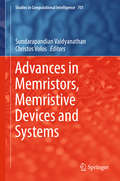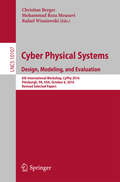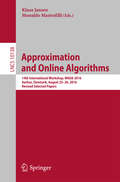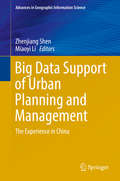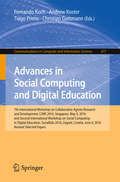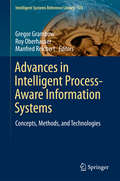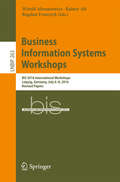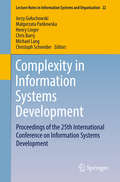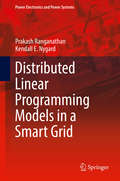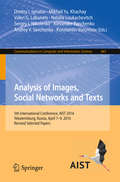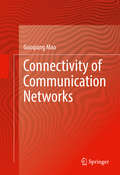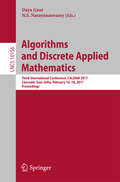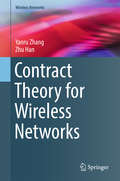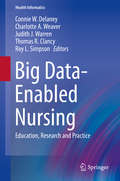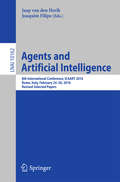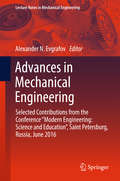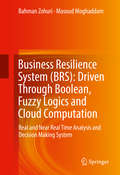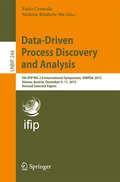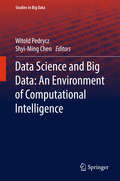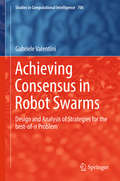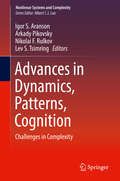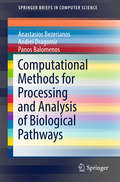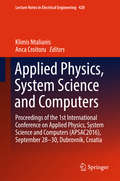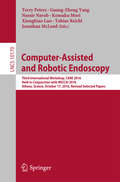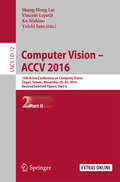- Table View
- List View
Advances in Memristors, Memristive Devices and Systems (Studies in Computational Intelligence #701)
by Sundarapandian Vaidyanathan Christos VolosThis book reports on the latest advances in and applications of memristors, memristive devices and systems. It gathers 20 contributed chapters by subject experts, including pioneers in the field such as Leon Chua (UC Berkeley, USA) and R. S. Williams (HP Labs, USA), who are specialized in the various topics addressed in this book, and covers broad areas of memristors and memristive devices such as: memristor emulators, oscillators, chaotic and hyperchaotic memristive systems, control of memristive systems, memristor-based min-max circuits, canonic memristors, memristive-based neuromorphic applications, implementation of memristor-based chaotic oscillators, inverse memristors, linear memristor devices, delayed memristive systems, flux-controlled memristive emulators, etc. Throughout the book, special emphasis is given to papers offering practical solutions and design, modeling, and implementation insights to address current research problems in memristors, memristive devices and systems. As such, it offers a valuable reference book on memristors and memristive devices for graduate students and researchers with a basic knowledge of electrical and control systems engineering.
Cyber Physical Systems. Design, Modeling, and Evaluation: 6th International Workshop, CyPhy 2016, Pittsburgh, PA, USA, October 6, 2016, Revised Selected Papers (Lecture Notes in Computer Science #10107)
by Mohammad Reza Mousavi Christian Berger Rafael WisniewskiThis book constitutes the proceedings of the 5th International Workshop on Design, Modeling, and Evaluation of Cyber Physical Systems, CyPhy 2015, held as part of ESWeek 2015, in Amsterdam, The Netherlands, in October 2015. The 10 papers presented in this volume were carefully reviewed and selected from 13 submissions. They broadly interpret, from a diverse set of disciplines, the modeling, simulation, and evaluation of cyber-physical systems.
Approximation and Online Algorithms: 14th International Workshop, WAOA 2016, Aarhus, Denmark, August 25–26, 2016, Revised Selected Papers (Lecture Notes in Computer Science #10138)
by Klaus Jansen Monaldo MastrolilliThis book constitutes the thoroughly refereed post workshop proceedings of the 8th International Workshop on Approximation and Online Algorithms, WAOA 2010, held in Liverpool, UK, in September 2010 as part of the ALGO 2010 conference event. The 23 revised full papers presented were carefully reviewed and selected from 58 submissions. The workshop covered areas such as algorithmic game theory, approximation classes, coloring and partitioning, competitive analysis, computational finance, cuts and connectivity, geometric problems, inapproximability results, echanism design, network design, packing and covering, paradigms for design and analysis of approximation and online algorithms, parameterized complexity, randomization techniques, real-world applications, and scheduling problems.
Big Data Support of Urban Planning and Management: The Experience in China (Advances in Geographic Information Science)
by Zhenjiang Shen Miaoyi LiIn the era of big data, this book explores the new challenges of urban-rural planning and management from a practical perspective based on a multidisciplinary project. Researchers as contributors to this book have accomplished their projects by using big data and relevant data mining technologies for investigating the possibilities of big data, such as that obtained through cell phones, social network systems and smart cards instead of conventional survey data for urban planning support. This book showcases active researchers who share their experiences and ideas on human mobility, accessibility and recognition of places, connectivity of transportation and urban structure in order to provide effective analytic and forecasting tools for smart city planning and design solutions in China.
Advances in Social Computing and Digital Education: 7th International Workshop on Collaborative Agents Research and Development, CARE 2016, Singapore, May 9, 2016 and Second International Workshop on Social Computing in Digital Education, SocialEdu 2016, Zagreb, Croatia, June 6, 2016, Revised Selected Papers (Communications in Computer and Information Science #677)
by Fernando Koch Christian Guttmann Andrew Koster Tiago PrimoThis book constitutes the refereed proceedings of the 7th International Workshop on Collaborative Agents Research and Development, CARE 2016, held in Singapore in May 2016 and Second International Workshop on Social Computing in Digital Education, SocialEdu 2016, held in Zagreb, Croatia, in June 2016. For CARE 2016 there were 4 papers selected out of 7 submissions, and for SocialEdu 5 papers were selected from 7 submissions. The 9 extended and revised full papers presented were carefully reviewed. The papers deal with topics like techniques of continuous monitoring, human behaviour analysis, recommendation systems, adjustment of education activities, intelligent content placement, and others.
Advances in Intelligent Process-Aware Information Systems: Concepts, Methods, and Technologies (Intelligent Systems Reference Library #123)
by Manfred Reichert Gregor Grambow Roy OberhauserThis book provides a state-of-the-art perspective on intelligent process-aware information systems and presents chapters on specific facets and approaches applicable to such systems. Further, it highlights novel advances and developments in various aspects of intelligent process-aware information systems and business process management systems. Intelligence capabilities are increasingly being integrated into or created in many of today's software products and services. Process-aware information systems provide critical computing infrastructure to support the various processes involved in the creation and delivery of business products and services. Yet the integration of intelligence capabilities into process-aware information systems is a non-trivial yet necessary evolution of these complex systems. The book's individual chapters address adaptive process management, case management processes, autonomically-capable processes, process-oriented information logistics, process recommendations, reasoning over process models, process portability, and business process intelligence. The primary target groups are researchers and PhD/Master students in the field of information systems.
Business Information Systems Workshops: BIS 2016 International Workshops, Leipzig, Germany, July 6-8, 2016, Revised Papers (Lecture Notes in Business Information Processing #263)
by Witold Abramowicz Rainer Alt Bogdan FranczykBusiness information systems is a rapidly developing domain. There are many topicsthatdeserveattentionbuthavenotyetfoundaplaceincanonicalresearch. Workshops give researchers the possibility to share preliminary ideas, ?rst - perimental results, or to discuss research hypotheses. Discussions held during presentations strengthen the paper and prepare it for publication. From our - perience, workshops are a perfect instrument with which to create a community aroundvery speci?c researchtopics, thus o?ering the opportunity to promote it. Topics that do not ?nd critical feedback at the main International Conference on Business Information Systems (BIS) may experience fruitful discussion when confronted with a well-focused audience. Over the last few decades, business informationsystems have been one of the most important factors of the transition toward a knowledge-based economy. At the same time they have been subject to continuous rapid development and innovation driven both by industry and by academia. For the last 12 years these innovations were carefully observed but also shaped by researchers attending BIS yearly.
Complexity in Information Systems Development: Proceedings of the 25th International Conference on Information Systems Development (Lecture Notes in Information Systems and Organisation #22)
by Michael Lang Christoph Schneider Chris Barry Henry Linger Jerzy Gołuchowski Małgorzata PańkowskaThis volume is a collection of papers on emerging concepts, approaches and ideas in information systems research. It examines theoretical and methodological issues related to both information systems development in general and the complexity of information systems as socio-technical systems. The book draws on invited papers selected from the proceedings of the 25th International Conference on Information Systems Development (ISD) held in Katowice, Poland, August 24 - 26, 2016. The invited conference papers were revised and expanded and present research that is focused on context, creativity, and cognition in information systems development. These issues are significant as they provide the basis for organizations to identify new markets, support innovative technology deployment, and enable mobile applications to detect, sense, interpret, and respond to the environment.
A Distributed Linear Programming Models in a Smart Grid (Power Electronics and Power Systems)
by Prakash Ranganathan Kendall E. NygardThis book showcases the strengths of Linear Programming models for Cyber Physical Systems (CPS), such as the Smart Grids. Cyber-Physical Systems (CPS) consist of computational components interconnected by computer networks that monitor and control switched physical entities interconnected by physical infrastructures. A fundamental challenge in the design and analysis of CPS is the lack of understanding in formulating constraints for complex networks. We address this challenge by employing collection of Linear programming solvers that models the constraints of sub-systems and micro grids in a distributed fashion. The book can be treated as a useful resource to adaptively schedule resource transfers between nodes in a smart power grid. In addition, the feasibility conditions and constraints outlined in the book will enable in reaching optimal values that can help maintain the stability of both the computer network and the physical systems. It details the collection of optimization methods that are reliable for electric-utilities to use for resource scheduling, and optimizing their existing systems or sub-systems. The authors answer to key questions on ways to optimally allocate resources during outages, and contingency cases (e. g. , line failures, and/or circuit breaker failures), how to design de-centralized methods for carrying out tasks using decomposition models; and how to quantify un-certainty and make decisions in the event of grid failures.
Analysis of Images, Social Networks and Texts: 5th International Conference, AIST 2016, Yekaterinburg, Russia, April 7-9, 2016, Revised Selected Papers (Communications in Computer and Information Science #661)
by Andrey V. Savchenko Dmitry I. Ignatov Mikhail Yu. Khachay Alexander Panchenko Valeri G. Labunets Natalia Loukachevitch Sergey I. Nikolenko Konstantin VorontsovThis book constitutes the proceedings of the 5th International Conference on Analysis of Images, Social Networks and Texts, AIST 2016, held in Yekaterinburg, Russia, in April 2016. The 23 full papers, 7 short papers, and 3 industrial papers were carefully reviewed and selected from 142 submissions. The papers are organized in topical sections on machine learning and data analysis; social networks; natural language processing; analysis of images and video.
Connectivity of Communication Networks
by Guoqiang MaoThis book introduces a number of recent developments on connectivity of communication networks, ranging from connectivity of large static networks and connectivity of highly dynamic networks to connectivity of small to medium sized networks. This book also introduces some applications of connectivity studies in network optimization, in network localization, and in estimating distances between nodes. The book starts with an overview of the fundamental concepts, models, tools, and methodologies used for connectivity studies. The rest of the chapters are divided into four parts: connectivity of large static networks, connectivity of highly dynamic networks, connectivity of small to medium sized networks, and applications of connectivity studies.
Algorithms and Discrete Applied Mathematics: Third International Conference, CALDAM 2017, Sancoale, Goa, India, February 16-18, 2017, Proceedings (Lecture Notes in Computer Science #10156)
by Daya Gaur N. S. NarayanaswamyThis book constitutes the proceedings of the Third International Conference on Algorithms and Discrete Applied Mathematics, CALDAM 2017, held in Goa, India, in February 2017. The 32 papers presented in this volume were carefully reviewed and selected from 103 submissions. They deal with the following areas: algorithms, graph theory, codes, polyhedral combinatorics, computational geometry, and discrete geometry.
Contract Theory for Wireless Networks (Wireless Networks)
by Zhu Han Yanru ZhangThis book presents theoretical research between wireless communications, networking, and economics using the framework of contract theory. This work fills a void in the literature by closely combining contract theoretical approaches with wireless networks design problems. Topics covered include classification in contract theory, reward design, adverse selection, and moral hazard. The authors also explore incentive mechanisms for device-to-device communication in cellular networks, insurance plans for service assurance in cloud computing markets with incomplete information, multi-dimensional incentive mechanisms and tournament based incentive mechanisms in mobile crowdsourcing. Financial applications include financing contracts with adverse selection for spectrum trading in cognitive radio networks and complementary investment of infrastructure and service providers in wireless network visualization. This book offers a useful reference for engineers and researchers in the wireless communication community who seek to integrate the notions from contract theory and wireless engineering, while emphasizing on how contract theory can be applied in wireless networks. It is also suitable for advanced-level students studying information systems or communications engineering.
Big Data-Enabled Nursing: Education, Research and Practice (Health Informatics)
by Charlotte A. Weaver Connie W. Delaney Judith J. Warren Thomas R. Clancy Roy L. SimpsonHistorically, nursing, in all of its missions of research/scholarship, education and practice, has not had access to large patient databases. Nursing consequently adopted qualitative methodologies with small sample sizes, clinical trials and lab research. Historically, large data methods were limited to traditional biostatical analyses. In the United States, large payer data has been amassed and structures/organizations have been created to welcome scientists to explore these large data to advance knowledge discovery. Health systems electronic health records (EHRs) have now matured to generate massive databases with longitudinal trending. This text reflects how the learning health system infrastructure is maturing, and being advanced by health information exchanges (HIEs) with multiple organizations blending their data, or enabling distributed computing. It educates the readers on the evolution of knowledge discovery methods that span qualitative as well as quantitative data mining, including the expanse of data visualization capacities, are enabling sophisticated discovery. New opportunities for nursing and call for new skills in research methodologies are being further enabled by new partnerships spanning all sectors.
Agents and Artificial Intelligence: 8th International Conference, ICAART 2016, Rome, Italy, February 24-26, 2016, Revised Selected Papers (Lecture Notes in Computer Science #10162)
by Joaquim Filipe Jaap van den HerikThis book constitutes the thoroughly refereed post-conferenceproceedings of the Second International Conference on Agents andArtificial Intelligence, ICAART 2010, held in Valencia, Spain, inJanuary 2010. The 17 revised full papers presented together with an invited paper werecarefully reviewed and selected from 364 submissions. Same as theconference the papers are organized in two simultaneous tracks:Artificial Intelligence and Agents. The selected papers reflect theinterdisciplinary nature of the conference. The diversity of topics isan important feature of this conference, enabling an overall perceptionof several important scientific and technological trends.
Advances in Mechanical Engineering: Selected Contributions from the Conference “Modern Engineering: Science and Education”, Saint Petersburg, Russia, June 2016 (Lecture Notes in Mechanical Engineering)
by Alexander N. EvgrafovThis book draws together the most interesting recent results to emerge in mechanical engineering in Russia, providing a fascinating overview of the state of the art in the field in that country which will be of interest to a wide readership. A broad range of topics and issues in modern engineering are discussed, including dynamics of machines, materials engineering, structural strength and tribological behavior, transport technologies, machinery quality and innovations. The book comprises selected papers presented at the conference "Modern Engineering: Science and Education", held at the Saint Petersburg State Polytechnic University in 2016 with the support of the Russian Engineering Union. The authors are experts in various fields of engineering, and all of the papers have been carefully reviewed. The book will be of interest to mechanical engineers, lecturers in engineering disciplines and engineering graduates.
Business Resilience System (BRS) (BRS): Real and Near Real Time Analysis and Decision Making System
by Bahman Zohuri Masoud MoghaddamThis book provides a technical approach to a Business Resilience System with its Risk Atom and Processing Data Point based on fuzzy logic and cloud computation in real time. Its purpose and objectives define a clear set of expectations for Organizations and Enterprises so their network system and supply chain are totally resilient and protected against cyber-attacks, manmade threats, and natural disasters. These enterprises include financial, organizational, homeland security, and supply chain operations with multi-point manufacturing across the world. Market shares and marketing advantages are expected to result from the implementation of the system. The collected information and defined objectives form the basis to monitor and analyze the data through cloud computation, and will guarantee the success of their survivability's against any unexpected threats. This book will be useful for advanced undergraduate and graduate students in the field of computer engineering, engineers that work for manufacturing companies, business analysts in retail and e-Commerce, and those working in the defense industry, Information Security, and Information Technology.
Data-Driven Process Discovery and Analysis: 5th IFIP WG 2.6 International Symposium, SIMPDA 2015, Vienna, Austria, December 9-11, 2015, Revised Selected Papers (Lecture Notes in Business Information Processing #244)
by Paolo Ceravolo Stefanie Rinderle-MaThis book constitutes the thoroughlyrefereed proceedings of the Fourth InternationalSymposium on Data-Driven Process Discovery and Analysis held in Riva del Milan,Italy, in November 2014. The five revised full papers were carefully selected from21 submissions. Following the event, authors weregiven the opportunity to improve their papers with the insights they gainedfrom the symposium. During this edition, the presentations and discussionsfrequently focused on the implementation of process mining algorithms incontexts where the analytical process is fed by data streams. The selectedpapers underline the most relevant challenges identified and propose novelsolutions and approaches for their solution.
Data Science and Big Data: An Environment of Computational Intelligence (Studies in Big Data #24)
by Witold Pedrycz Shyi-Ming ChenThis book presents a comprehensive and up-to-date treatise of a range of methodological and algorithmic issues. It also discusses implementations and case studies, identifies the best design practices, and assesses data analytics business models and practices in industry, health care, administration and business. Data science and big data go hand in hand and constitute a rapidly growing area of research and have attracted the attention of industry and business alike. The area itself has opened up promising new directions of fundamental and applied research and has led to interesting applications, especially those addressing the immediate need to deal with large repositories of data and building tangible, user-centric models of relationships in data. Data is the lifeblood of today's knowledge-driven economy. Numerous data science models are oriented towards end users and along with the regular requirements for accuracy (which are present in any modeling), come the requirements for ability to process huge and varying data sets as well as robustness, interpretability, and simplicity (transparency). Computational intelligence with its underlying methodologies and tools helps address data analytics needs. The book is of interest to those researchers and practitioners involved in data science, Internet engineering, computational intelligence, management, operations research, and knowledge-based systems.
Achieving Consensus in Robot Swarms: Design and Analysis of Strategies for the best-of-n Problem (Studies in Computational Intelligence #706)
by Gabriele ValentiniThis book focuses on the design and analysis of collective decision-making strategies for the best-of-n problem. After providing a formalization of the structure of the best-of-n problem supported by a comprehensive survey of the swarm robotics literature, it introduces the functioning of a collective decision-making strategy and identifies a set of mechanisms that are essential for a strategy to solve the best-of-n problem. The best-of-n problem is an abstraction that captures the frequent requirement of a robot swarm to choose one option from of a finite set when optimizing benefits and costs. The book leverages the identification of these mechanisms to develop a modular and model-driven methodology to design collective decision-making strategies and to analyze their performance at different level of abstractions. Lastly, the author provides a series of case studies in which the proposed methodology is used to design different strategies, using robot experiments to show how the designed strategies can be ported to different application scenarios.
Advances in Dynamics, Patterns, Cognition: Challenges in Complexity (Nonlinear Systems and Complexity #20)
by Arkady Pikovsky Igor S. Aranson Nikolai F. Rulkov Lev S. TsimringThis book focuses on recent progress in complexity research based on the fundamental nonlinear dynamical and statistical theory of oscillations, waves, chaos, and structures far from equilibrium. Celebrating seminal contributions to the field by Prof. M. I. Rabinovich of the University of California at San Diego, this volume brings together perspectives on both the fundamental aspects of complexity studies, as well as in applications in different fields ranging from granular patterns to understanding of the cognitive brain and mind dynamics. The slate of world-class authors review recent achievements that together present a broad and coherent coverage of modern research in complexity greater than the sum of its parts.
Computational Methods for Processing and Analysis of Biological Pathways (SpringerBriefs in Computer Science)
by Anastasios Bezerianos Andrei Dragomir Panos BalomenosThis work offers a guided walkthrough of one of the most promising research areas in modern life sciences, enabling a deeper understanding of involved concepts and methodologies via an interdisciplinary view, focusing on both well-established approaches and cutting-edge research. Highlighting what pathway analysis can offer to both the experimentalist and the modeler, the text opens with an introduction to a general methodology that outlines common workflows shared by several methods. This is followed by a review of pathway and sub-pathway based approaches for systems pharmacology. The work then presents an overview of pathway analysis methods developed to model the temporal aspects of drug- or disease-induced perturbations and extract relevant dynamic themes. The text concludes by discussing several state-of-the-art methods in pathway analysis, which address the important problem of identifying differentially expressed pathways and sub-pathways.
Applied Physics, System Science and Computers: Proceedings of the 1st International Conference on Applied Physics, System Science and Computers (APSAC2016), September 28-30, Dubrovnik, Croatia (Lecture Notes in Electrical Engineering #428)
by Klimis Ntalianis Anca CroitoruThis book reports on advanced theories and methods in three related fields of research: applied physics, system science and computers. It is organized in two main parts, the first of which covers applied physics topics, including lasers and accelerators; condensed matter, soft matter and materials science; nanoscience and quantum engineering; atomic, molecular, optical and plasma physics; as well as nuclear and high-energy particle physics. It also addresses astrophysics, gravitation, earth and environmental science, as well as medical and biological physics. The second part focuses on advances in system science and computers, exploring automatic circuit control, power systems, computer communication, fluid mechanics, simulation and modeling, software engineering, data structures and applications of artificial intelligence among other areas. Offering a collection of contributions presented at the 1st International Conference on Applied Physics, System Science and Computers (APSAC 2016), the book bridges the gap between applied physics and electrical engineering. It not only to presents new methods, but also promotes collaborations between different communities working on related topics at the interface between physics and engineering, with a special focus on communication, data modeling and visualization, quantum information, applied mechanics as well as bio and geophysics.
Computer-Assisted and Robotic Endoscopy: Third International Workshop, CARE 2016, Held in Conjunction with MICCAI 2016, Athens, Greece, October 17, 2016, Revised Selected Papers (Lecture Notes in Computer Science #10170)
by Xiongbiao Luo Tobias Reichl Kensaku Mori Guang-Zhong Yang Terry Peters Nassir Navab Jonathan McleodThis book constitutes the refereed proceedings of the First International Workshop on Computer Assisted and Robotic Endoscopy, CARE 2014, held in conjunction with MICCAI 2014, in Boston, MA, USA, in September 2014. The 12 papers presented focus on recent technical advances associated with computer vision; graphics; robotics and medical imaging; external tracking systems; medical device control systems; information processing techniques; endoscopy; planning and simulation.
Computer Vision – ACCV 2016: 13th Asian Conference on Computer Vision, Taipei, Taiwan, November 20-24, 2016, Revised Selected Papers, Part II (Lecture Notes in Computer Science #10112)
by Ko Nishino Shang-Hong Lai Vincent Lepetit Yoichi SatoThe five-volume set LNCS 10111-10115 constitutes the thoroughly refereed post-conference proceedings of the 13th Asian Conference on Computer Vision, ACCV 2016, held in Taipei, Taiwan, in November 2016. The total of 143 contributions presented in these volumes was carefully reviewed and selected from 479 submissions. The papers are organized in topical sections on Segmentation and Classification; Segmentation and Semantic Segmentation; Dictionary Learning, Retrieval, and Clustering; Deep Learning; People Tracking and Action Recognition; People and Actions; Faces; Computational Photography; Face and Gestures; Image Alignment; Computational Photography and Image Processing; Language and Video; 3D Computer Vision; Image Attributes, Language, and Recognition; Video Understanding; and 3D Vision.
